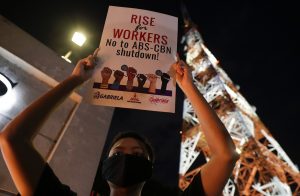ABS-CBN, the largest TV broadcaster in the Philippines, was forced off the air just before 8 p.m. Tuesday night by a government agency, leading to shock and outrage from domestic and international journalists and press freedom watchdog groups.
Over 11,000 people employed by the network could lose their jobs due to the order by the National Telecommunications Commission (NTC), which comes as much of the Philippines, including the metro Manila area, remains under quarantine due to the COVID-19 pandemic.
The network, which had aired reports critical of President Rodrigo Duterte and drawn his ire over allegations it had failed to air his campaign advertisements, had been awaiting a franchise renewal from the Philippine Congress when it was served a cease and desist order and ordered to stop its broadcasts, despite earlier being assured it could continue to operate.
ABS-CBN was last ordered closed in 1972, when dictator Ferdinand Marcos declared martial law, and resumed operations months after Marcos was overthrown in 1986.
The network will continue its online and cable operations, neither of which is affected by the stoppage order. ABS-CBN journalist Mike Navallo told BBC World News on Wednesday he and his colleagues would be retained for at least three months.
But the network’s disappearance from broadcast TV and radio will leave countless households without a source of news. Many households in rural areas relied on ABS-CBN as the only available news channel.
Jose Calida, solicitor general of the NTC, said Wednesday the failure of Congress to renew ABS-CBN’s franchise was to blame for the network going off the air.
However, ABS-CBN’s Navallo reported Wednesday evening it had obtained a document, which it published on its website, showing Calida had pressured the NTC to issue a cease and desist order on April 30.
The franchise renewal had earlier stalled in Congress, however, and two congressmen said Tuesday House Speaker Alan Cayetano, a Duterte ally, was responsible for slowing the progress of the bill.
The congressmen accused Cayetano, who has himself criticized ABS-CBN for unfair election coverage, of delaying hearings on franchise renewal bills and for his earlier claim that ABS-CBN could continue to operate after May 4.
On Wednesday, a new bill granting ABS-CBN a new 25-year franchise was filed in the House. Senate President Vicente Sotto III said Tuesday that, should a franchise bill be brought to the Senate, “we will approve it.”
In a statement signed by dozens of civil society groups, NGOs, and reporters, the Philippine Center for Investigative Journalism called the shutdown an “assault on media freedom” driven by Duterte’s animosity toward the network.
“It is doubly despicable that it happens as our people battle a deadly pandemic, which they will need timely and accurate information to defeat,” the statement read. “To take away a network with a reach so broad there are areas where it is the only source of information could prove fatal during this plague.”
Phil Robertson, deputy Asia director of Human Rights Watch, said the decision comes “on the heels of efforts by the Duterte administration to intimidate and muzzle the press” and called on the NTC to rescind its order. “The solicitor general should stop acting like Duterte’s attack dog,” he said.
In February, the government threatened to strip the license of ABS-CBN after accusing it of violating a constitutional restriction against foreign ownership of mass media. The same accusation had been used in 2018 against Rappler, which had its license revoked and saw its editor, Maria Ressa, face multiple criminal charges.
Since becoming president, Duterte has repeatedly lashed out at ABS-CBN and the prominent family that owns the network. He called ABS-CBN “rude” in March 2017 and said “karma will come” to them. The next month, he accused the network of “swindling” him by not airing political advertisements he had paid for.
In December 2019, Duterte repeated a threat that the network’s franchise would end. “If you expect it to be renewed, I’m sorry,” he said. “I will see to it that you’re out.”
Although Duterte later accepted an apology and explanation of the advertisement ordeal from ABS-CBN, his animosity toward the network remained. It nevertheless shocked Filipinos to see the network yanked from the air in the midst of the COVID-19 pandemic.
The abrupt order also cast a pall over the ABS-CBN newsroom as TV screens around the country went to static. ABS-CBN journalist Jeff Canoy shared photos and videos on Twitter of what he called an “emotional night” – made worse by the ongoing pandemic.
“We can’t even hug each other,” he wrote.

































